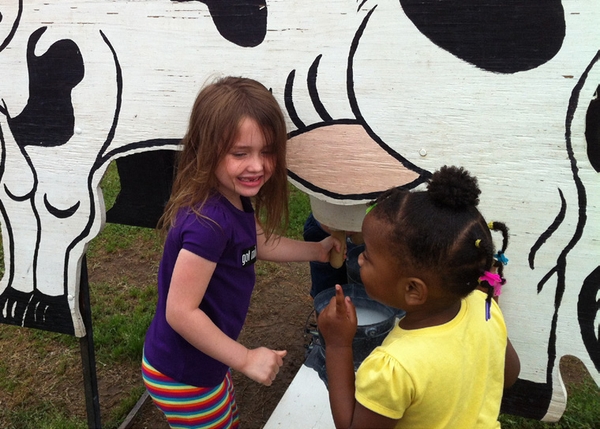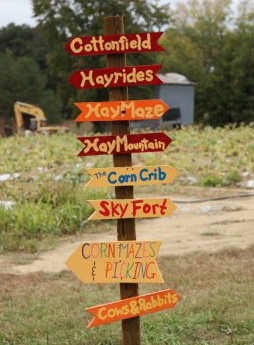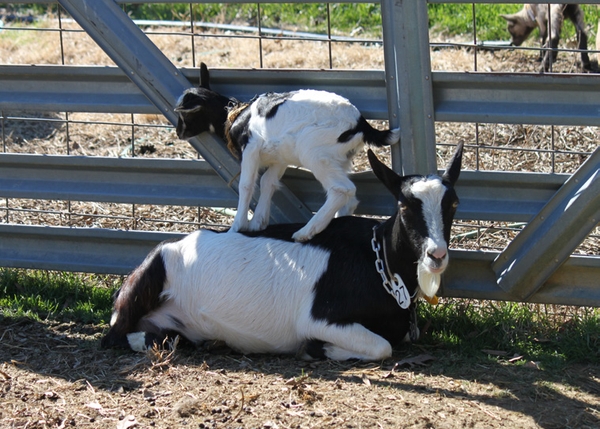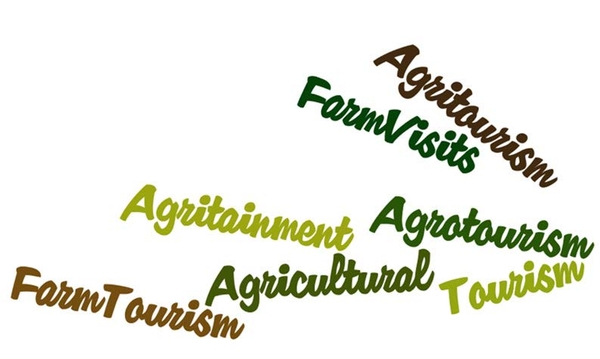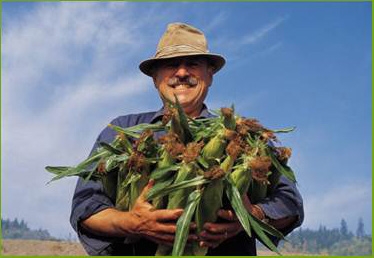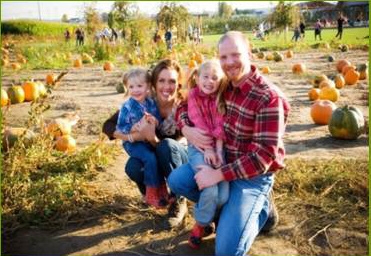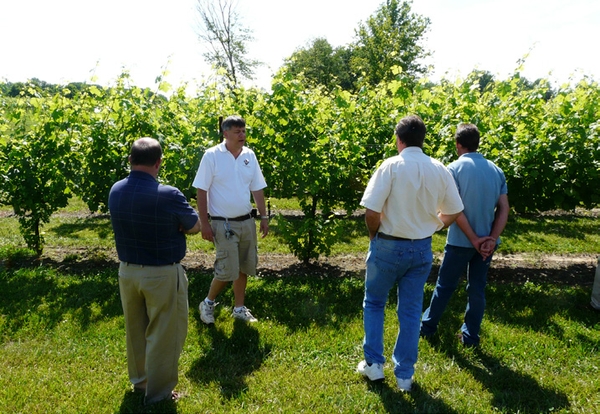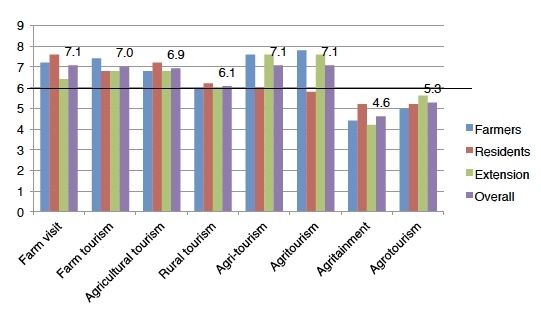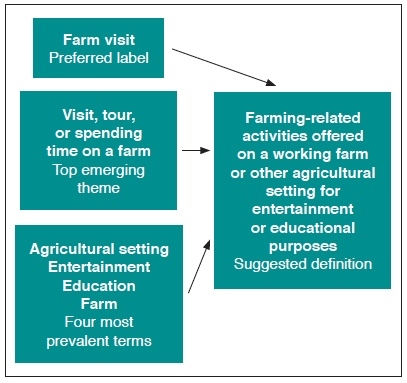Agritourism* is one of the many labels used to describe recreational activities offered on farms and in other types of agricultural settings. However, this label is often used interchangeably with many others, such as agricultural tourism, farm tourism, agritainment, and farm visits (Colton & Bissix, 2005). Likewise, agritourism and similar labels have been defined in a variety of ways.
These varying definitions and labels cause problems for stakeholder groups. For example, farm visitors are often confused regarding the types of activities being offered; farmers are not reaching their target tourism markets, which may be hampering their ability to increase revenues; and extension faculty experience difficulty in communicating about and researching agricultural tourism (Colton & Bissix, 2005; Phillip et al., 2010).
There is a need for a better understanding of what people mean when they say “agritourism,” so farmers can realize the full economic benefit of this activity. To that end, the authors conducted a study to discover the preferences of farmers, local residents (visitors or potential visitors), and extension faculty in North Carolina and Missouri with regard to labels for and definitions of agritourism, and to determine where common ground lies among these groups.
*Note: Although the purpose of this study is to identify a shared label for and definition of recreation in agricultural settings (e.g., farms, ranches), for readability purposes this paper will refer to such activity as agritourism. ↲
Methodology
In 2010, 252 farmers, 868 residents, and 155 extension faculty from Missouri and North Carolina responded to an online survey, providing a total of 1,275 responses. The survey asked about respondents’ sociodemographic characteristics, their preferences with regard to eight agritourism-related labels commonly found in the literature (such as agri-tourism and farm tourism), and what words (such as agricultural setting, farm, and education) they think should be included in a good definition of agritourism. Respondents were also asked to write in their preferred labels to describe visiting a farm for recreational purposes and what comes to their mind when they hear or read the word agritourism. The authors used chi-square and analysis of variance tests (α = 0.05) to compare preferences among farmers, residents, and extension faculty.
Results
Respondent Profiles
Below is a summary of profile characteristics for the majority of respondents from each of the three groups.
Farmers
- 252 farmers responded
- 76 from Missouri
- 176 from North Carolina
- Female: 69%
- Average age: 54 years
- 83% own or manage a farm
- 92% currently offer agritourism
- 75% say agritourism is important for their farm
- 72% plan to add more agritourism activities
Residents
- 868 residents responded
- 355 from Missouri
- 513 from North Carolina
- Female: 58%
- Average age: 46 years
- Average income: $35,000– $50,000
- 39% live in an urban area
- 32% have a college degree or higher
- 31% have visited an agritourism farm for recreation in the past
- 36% are likely to visit an agritourism farm in the next year
Extension Faculty
- 155 extension faculty responded
- 68 from Missouri
- 87 from North Carolina
- Female: 51%
- Average age: 45 years
- 61% are state or county extension directors
- 77% work with farmers
- 73% work with agritourism farmers
Label Preferences
Respondents were asked to use a 10-point scale (where 1 means dislike very much and 10 means like very much) to rate their preferences for eight commonly used agritourism-related labels. The labels most preferred overall (those that scored above 6 for all three groups of respondents) to illustrate recreational activities offered in agricultural settings were:
- Farm visit (7.1)
- Farm tourism (7.0)
- Agricultural tourism (6.9)
However, as depicted in Figure 1, farmers, residents, and extension faculty had different preferences for the labels examined. Residents mostly preferred farm visit, agricultural tourism, and farm tourism, which the other groups also liked. Although farmers and extension faculty preferred agritourism and agri-tourism, residents disliked those labels. All three groups disliked the labels agritainment and agrotourism.
When asked to describe what came to mind when they heard or read the word agritourism, visit, tour, and spending time on a farm emerged as the predominant themes among farmers (95 responses), residents (198 responses), and extension faculty (64 responses).
Importantly, for a relatively large proportion of residents (78 responses), the word agritourism meant nothing (they said, for example, “I have no clue”) or even had negative connotations (e.g., “sounds weird,” “not pleasant,” “like a disease”).
Definitional Elements
Most respondents indicated that a good definition of agritourism should include the words agricultural setting (80%), entertainment (74%), education (73%), and farm (72%), as shown in Figure 2.
When examined separately, though, the three groups showed different preferences for wording used to define agritourism. The proportion of farmers (84%) and extension faculty (83%) who preferred agricultural setting was considerably larger than the proportion of residents (72%) who did so. Significantly more farmers (79%) than residents (69%) and extension faculty (68%) said that the word farm should be included in such a definition. All three groups showed similar levels of support for use of the words entertainment and farming.
When respondents were asked to list up to five words to describe visiting a farm for recreational purposes, the following five words emerged:
- Education (such as learning, teaching, information) appeared as a top theme listed by residents (343 responses), farmers (133 responses), and extension faculty (74 responses).
- Experience, either as hands-on activities (e.g., pick-your-own produce, interaction with animals) or as an overall farm adventure, was also a recurrent theme among residents (328 responses), farmers (66 responses), and extension faculty (32 responses).
- Connection to the land and the outdoors (e.g., a back-to-basics approach) emerged as significant among residents (206 responses) and farmers (68 responses).
- Fun emerged as a theme among residents (130 responses) and extension faculty (31 responses).
- Agritourism, tours, and visits (including agri tourism, ag tourism, and agro tourism) were predominantly listed by farmers (147 responses) and extension faculty (122 responses).
Conclusions
Results of this study showed that farmers, residents, and extension faculty have dissimilar preferences regarding labels for agritourism-related concepts and regarding definitions of agritourism.
Farm visit appeared to be the preferred label for both farmers and residents. Given the key roles that farmers (as the providers) and residents (as the consumers) play in this form of recreation, the authors encourage the use of this label to provide a clearer, more coherent message.
Additionally, visit, tour, and spending time on a farm emerged as the most predominant themes, and agricultural setting, entertainment, education, and farm were the most preferred words. Farmers and agencies promoting this type of recreation should make sure to use these words and themes in their marketing communications to better capture the attention of current and potential visitors.
Based on the results of this study, a suitable definition of agritourism would be: Farming-related activities offered on a working farm or other agricultural setting for entertainment or educational purposes.
Study results also suggest that care should be exercised when using the label agritourism, because the word did not mean anything or suggested a negative connotation for a large proportion of residents. Therefore, farmers or faculty who use the label agritourism in communicating with the public should make additional efforts to teach audiences what this activity entails, such as using examples to illustrate the label’s meaning.
Although this study was designed to capture two states (Missouri and North Carolina) representing different agritourism contexts, caution is advised in extrapolating study results elsewhere. Other regions may have different characteristics (e.g., agricultural context, landscape characteristics, more specialized agritourism offerings) that influence stakeholders’ preferences, which may lead to different understandings of the meaning of agritourism.
By identifying variations in preferences with regard to the definition of agritourism and the labels for agritourism-related activities among different stakeholders, this study has paved the way toward a shared understanding of agritourism.
Acknowledgments
We wish to thank the following reviewers of this publication: Martha Glass, manager of the Agritourism Office, North Carolina Department of Agriculture and Consumer Services; Stephen Komar, county agricultural and resource management agent, Rutgers University; and Bill Carson, CEO, Altapass Orchard.
References
Colton, J., & Bissix, G. (2005). Developing agritourism in Nova Scotia: Issues and challenges. Journal of Sustainable Agriculture. 27(1): 91-112.
Phillip, S., Hunter, C., & Blackstock, K. (2010). A typology for defining agritourism. Tourism Management. 31(6): 754-758.
Prepared By
Samantha Rozier Rich, PhD, Tourism Extension Specialist
Shuangyu Xu, MS
Department of Parks, Recreation & Tourism Management
North Carolina State University
Carla Barbieri, PhD, Assistant Professor
Claudia Gil Arroyo, MS
Department of Parks, Recreation & Tourism
University of Missouri
Publication date: Jan. 1, 2012
Reviewed/Revised: March 29, 2024
AG-768
N.C. Cooperative Extension prohibits discrimination and harassment regardless of age, color, disability, family and marital status, gender identity, national origin, political beliefs, race, religion, sex (including pregnancy), sexual orientation and veteran status.

